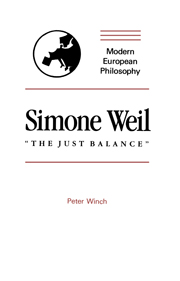Book contents
- Frontmatter
- Contents
- Acknowledgements
- 1 Introduction
- 2 The Cartesian background
- 3 The sensations of the present moment
- 4 “La simple perception de la nature est une sorte de danse”
- 5 Language
- 6 Necessity
- 7 Equilibrium
- 8 “Completely free action”
- 9 The power to refuse
- 10 “The void”
- 11 Geometry
- 12 Incommensurability
- 13 Beauty
- 14 Justice
- 15 “A supernatural virtue”?
- Notes
- Bibliography
- Index
- Frontmatter
- Contents
- Acknowledgements
- 1 Introduction
- 2 The Cartesian background
- 3 The sensations of the present moment
- 4 “La simple perception de la nature est une sorte de danse”
- 5 Language
- 6 Necessity
- 7 Equilibrium
- 8 “Completely free action”
- 9 The power to refuse
- 10 “The void”
- 11 Geometry
- 12 Incommensurability
- 13 Beauty
- 14 Justice
- 15 “A supernatural virtue”?
- Notes
- Bibliography
- Index
Summary
Waiting for God contains a section called “Love of the Order of the World” (which is one of the “forms of the implicit love of God”). It describes those features of the human condition which give rise to the problems discussed in the essay on “reading” in the following terms.
Just as God, being outside the universe, is at the same time the centre, so each man imagines he is situated in the centre of the world. The illusion of perspective places him at the centre of space; an illusion of the same kind falsifies his idea of time; and yet another kindred illusion arranges a whole hierarchy of values around him. This illusion is extended even to our sense of existence, on account of the intimate connection between our sense of value and our sense of being; being seems to us less and less concentrated the further it is removed from us.
With one extremely important exception that passage might be an exposition of Spinoza's position. I want to spend some time exploring the comparison with Spinoza in the belief that this will help to articulate Simone Weil's point. In Chapter 9 I quoted a passage from “Essai sur la notion de lecture” in which she claimed that it is better to pose questions about the relative value of one form of action as compared with another in the concrete terms provided by the notion of “reading” than in the abstract terms used by Kant, partly because it combines questions about the “correctness” of valuations with questions about possible motivations for acting.
- Type
- Chapter
- Information
- Simone Weil: "The Just Balance" , pp. 120 - 132Publisher: Cambridge University PressPrint publication year: 1989



